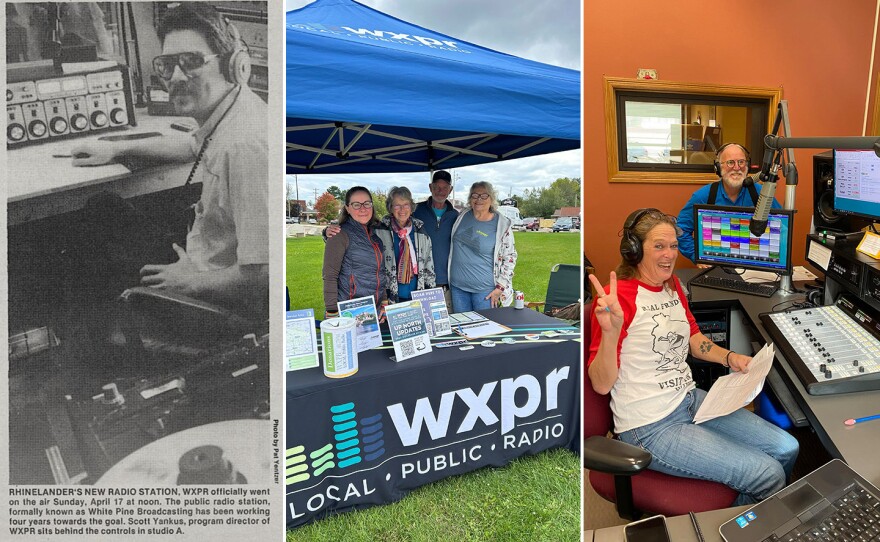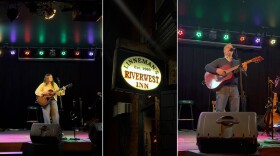They lift your spirits, prompt you to think, make you feel grateful and inspire you to do more. They connect you to our community, shining a spotlight on what's good about our city. They're stories that are Uniquely Milwaukee, sponsored by the Milwaukee Public Library.
This fall marks a turning point for public-media outlets across the country. As of Oct. 1, federal funding for PBS, NPR and their local stations stopped. This $1.1 billion cut — a directive from the Trump administration — triggered widespread job cuts, restructurings and closures of hundreds of outlets across the country.
The funding once came from the Corporation for Public Broadcasting (CPB) created by Congress in 1967. Fifty-eight years later, President Donald Trump directed CPB funding to cease, claiming in part that it has become biased. He also claimed that “government funding of news media is outdated and unnecessary”.
Radio Milwaukee is a public-media station, and as we begin our fall membership drive, we’re feeling the impact — as are our sister stations across the state, like WXPR in northern Wisconsin.
“We've felt it,” the station’s CEO and general manager Jessie Dick told me. “There have been times where a story comes in that we wanna cover, and we can't. That's a really difficult thing to say, you know? ‘We just don't have the reporter power to make this happen.’
“We're looking at how we cover news, how we can kind of shift those stories. The stories that we are covering don't just impact one community, but kind of have a relevance to everybody who lives in this region.”
In this episode of Uniquely Milwaukee, you’ll hear more from Jessie Dick about the impact of funding cuts on WXPR, the value of public media — especially in rural communities — and how they’re staying proactive.
A six-figure hole
For more than 40 years, WXPR has been supported by its members. This year, one of its longest sustainers, the federal government, dropped out and created a 25% budget gap for the small NPR affiliate based in rural Rhinelander, Wisc. According to Dick, that amounts to a loss of $171,000 per year over the next five years. It was a situation their board and staff tried to prepare for.
“When we immediately heard the news, we were devastated,” she said. “But we've had some time to kind of take a look at the preparations that we made in the last six months, and then right now being able to kind of take a look at the current staff that we have, which feels very tight, but then looking at where we need to grow.”
They haven’t made job cuts in 2025, but Dick says that last year they let a journalist go, left a position vacant and restructured their development staff. To put that in context, WXPR had a high of 11 employees during the pandemic thanks to extra CPB funding. That’s now dropped to five full-time staff and two part-timers. Of these, just one is a local reporter who has to cover a lot of ground.
“We take a look at how important healthcare is and the environment to people that live up here,” Dick began. “And then especially when it comes to elections, having that well-informed constituents that live in this area so they're able to vote and to uphold democracy.
“Having reporters that can not only get feedback from the listeners on the news that they want, but then also can take a deeper dive, I think that's one of the strengths that radio has. It's not always the latest breaking story, but it's actually taking a look at a story from different sides, different angles, and presenting it that way.”
The community impact
WXPR provides music, programs and news, covering nine counties in northern Wisconsin, Wausau and parts of Michigan. Some funding from the CPB was restricted to national programming, but Dick says a lot of the money went back to the community and paid for local reporters.
“All of our music programming is hosted by volunteers, so we’re fortunate when it comes to that,” she said. “But … we start Morning Edition bright and early every weekday, and then All Things Considered in the afternoon … we could not replace that with local content, local news content. So it is a value for us, and the station is programmed based on community input.”
Congress voted to end public-media funding in July, affecting more than 1,500 public-media TV and radio stations in the United States. The CPB has since shut down, and reports reveal that roughly 70% of its money directly funded nearly 600 PBS and NPR stations.
“You receive these funds, and you remain a neutral information source,” Dick said. “I think now, more than ever before, that is really important and really essential. And it also creates an opportunity for it to be completely free. There are so many times where you are looking for information, and it's behind a paywall, and you can't go past there. Public broadcasting creates information at a level that's accessible to all people.”
It will take time to see the full impact of the federal cuts to public media. This means a lot of unknowns and also more opportunities for collaboration. Dick says she’s seeing those working in public media coming together in new ways.
WXPR saw a boost to its Summer Pledge Drive this July and partnered with a community college for an outdoor concert. The station’s volunteers, members and the community are stepping up as well.
“The importance is that ongoing support, that it wouldn't just be a one-time thing,” Dick said. “We do need that level of support to continue. So I think that’s an important piece. We need to make sure our listeners know that in order to keep going and remaining strong, ongoing support is essential.”
We here at Radio Milwaukee echo her words as we continue to work for and be in the community. We appreciate your support all year long, but especially during our fall membership drive that goes through Oct. 10. You can also reach out to us any time during the year to become a volunteer, to collaborate or to become a sustaining member.
















